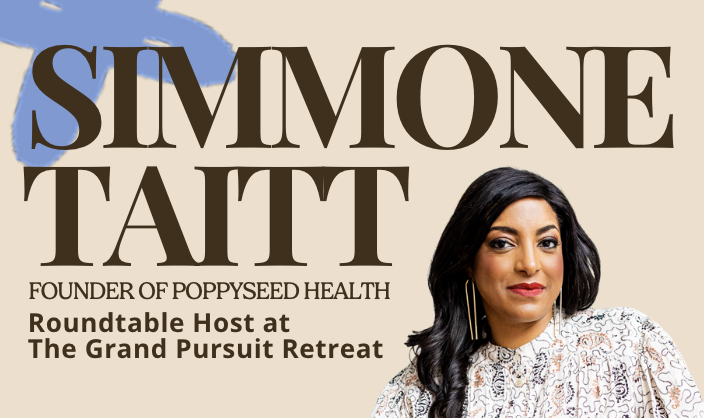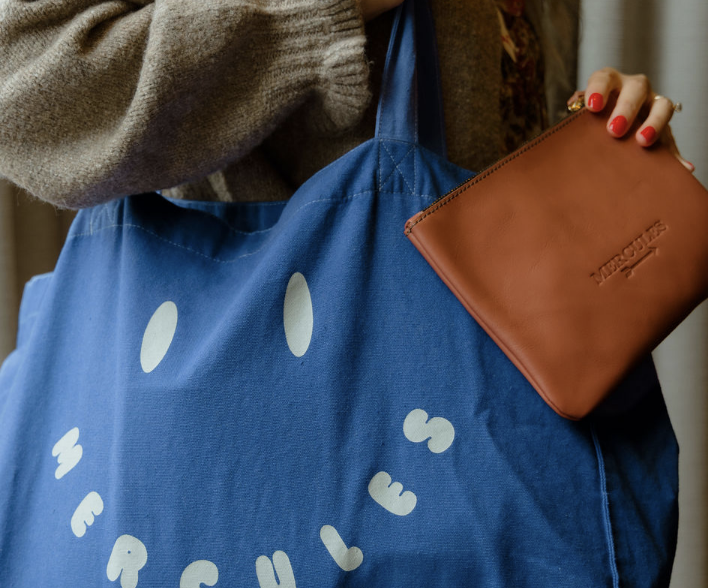Leading From Wholeness: How Simmone Taitt Is Revolutionizing Care Through Body Wisdom
You can tell a lot about a person by how they show up in crisis. Simmone Taitt and I had been part of the Seven Seven Six community for a while, but it wasn't until the weekend after the devastating LA fires at the start of this year that we actually met.
Simmone had posted a message to 776 founders calling for volunteers for a relief effort she was organizing for affected families. Without hesitation, I went in tow with my 4-month-old to help out.
There was something about watching her coordinate relief efforts, managing logistics, holding space for grieving families, all while navigating her own journey starting a family. What struck me most was how she showed up: present, grounded, and somehow both fierce and tender at once.
Her journey with Poppy Seed Health began from a deeply personal place. When she lost her first pregnancy, she had access to healthcare, but she didn't have access to care. That distinction clarified her mission. Most of us would have stepped back. But Simmone went deeper.
"Who do I want to be when I show up? What kind of leader do I need to be to serve people at their most vulnerable?"
Those questions led her to becoming a founder alive with purpose, building from wholeness instead of depletion.
Watching her journey unfold has been one of my favorite parts of building The Grand. From community member to now a founder revolutionizing maternal care, she's living proof that honoring your body's wisdom doesn't limit your capacity to lead. It reveals superpowers you never knew you had.
Her story is exactly why we do this work: ambitious mothers don't have to choose between building something meaningful and caring for themselves.
We like to think the world has evolved, but the harsh truth is that most business advice still comes from people who've never had to navigate hormonal shifts while making critical decisions, or who've never built a company while their body was literally creating life. In building a platform that supports people through pregnancy, loss, birth, and recovery, Simmone is discovering that the leadership qualities her body's wisdom taught her – listening to subtle signals, designing around natural rhythms, and leading with vulnerability – aren't obstacles to overcome, but superpowers to embrace.
This is exactly why I'm thrilled to have Simmone leading a roundtable on "The Foundation of Everything: Your Hormonal Health Superpower" at The Grand World retreat in October.
Here's how she's rewriting the rules of ambitious motherhood and conscious leadership, in her own words.
What energizes you most about building Poppy Seed Health while navigating your own motherhood journey?
What energizes me most is knowing that we're building something that not only fills the gap I experienced myself, but that affirms the full emotional, physical, and logistical reality of what it means to move through pregnancy, loss, birth, recovery, and everything in between.
When I lost my first pregnancy, I had access to healthcare—but I didn't have access to care. That distinction has shaped everything we've built. Now, being in this season of becoming a mother myself, it's not lost on me that I'm living inside the system we're trying to change. That alignment—between the personal and professional—isn't always easy, but it's powerful. It keeps me honest, and it keeps me close to the people we're serving.
Success, for me, doesn't look like a perfect product or a flawless roadmap. It looks like someone reaching out at 2am, in fear or in grief or in joy, and getting a response from someone who actually sees them. It looks like our workforce—our doulas, nurses, midwives—feeling valued, protected, and whole in the work they do. And it looks like a future where no one has to go through this alone.
Your roundtable focuses on hormonal health as a superpower. How did you shift from seeing self-care as selfish to seeing it as strategic?
It took me a long time to realize that self-care isn't the reward for surviving burnout—it's the strategy for not burning out in the first place. Especially as women, and especially as founders or mothers or caregivers, we're conditioned to give from depletion. But hormonal health has taught me that our bodies are sending signals all the time—we just haven't been taught to listen.
When I started to understand my own cycles, my shifts in energy, sleep, appetite, and mood—not as inconveniences but as data—I stopped fighting myself. I started designing my days, my diet, my movement, even my meetings, around when I was most resourced. And that changed everything.
Self-care, when it's rooted in hormonal awareness, becomes fuel. It's the infrastructure for your ambition, not a detour from it. And when I share that with other women, I remind them: this isn't indulgent. This is biochemical. It's strategic. And it's necessary if we want to lead and live in alignment with our own power.
What shifted for me? I stopped seeing rest as weakness and started seeing it as wisdom. I'm not building from exhaustion anymore—I'm building from wholeness.
How has understanding your own body made you a better leader for your team and clients?
The more I've learned to listen to my own body, the more capacity I have to listen to others—with real presence, not performance. Being attuned to my own health, especially through the lens of hormonal changes, recovery, and stress, has made me a more honest leader. I don't mask fatigue anymore. I name it. I don't push through everything—I pace.
That shift has changed how I lead my team. I model care as part of our workflow, not something outside of it. We build in breath. We normalize boundary-setting. And because of that, the people we serve get to feel something rare in healthcare: they get to feel held. Not just managed, not just treated—held.
Understanding my own body has also helped me show up with more empathy. Not just "I understand" empathy, but "I've been there" empathy. And when you're building a company that supports people at their most raw and tender moments, that matters. It doesn't mean I always get it right, but it means I'm never disconnected from why this work exists in the first place.
If everything you're building works, what does success look like for the next generation of women?
If everything we're building works, the next generation of women will grow up knowing that their bodies are sources of wisdom, not obstacles to overcome. They'll understand that their natural rhythms are strategic advantages, not inconveniences to mask. They'll have access to care that sees them as whole humans, not just medical cases.
They'll know that becoming a mother doesn't mean sacrificing their ambition—it means accessing new depths of their power. And they'll never have to choose between honoring their body's needs and pursuing their biggest dreams.
That's the world I'm building. That's what keeps me going.
What I love most about Simmone's approach isn't just her ability to build a revolutionary healthcare company while honoring her own journey, it's her commitment to leading from wholeness and her willingness to model what it looks like when you stop fighting your body and start listening to its wisdom. This is the kind of leadership that shifts how you see power itself—not as something you wield despite your humanity, but because of it.
This is exactly the conversation that transforms how you think about leadership itself. Not as something you do despite your body, but because of its wisdom. I can't wait to see the breakthroughs she'll spark in October.
— Rei






